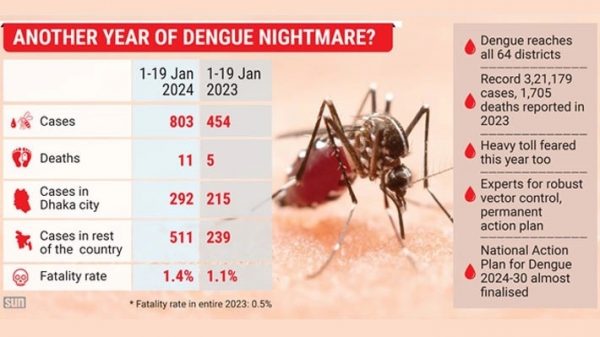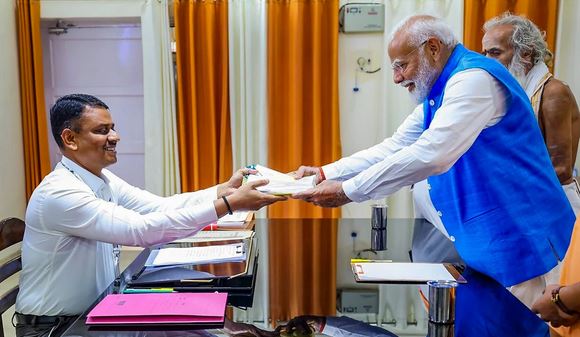Shawdesh desk:
The country may face a deadly dengue outbreak this year too as the fatality rate of the mosquito-borne disease has almost reached 1.5% even at the beginning of the year with a rise in both cases and deaths compared to last year, health experts say.
They fear that the situation will take an alarming turn during rainy season if extensive measures are not taken immediately to destroy Aedes mosquito, the vector of the deadly disease.
“The dengue infection is following a growing trend in the beginning of the year. Everyone has to remain alert. Whenever anyone feels fever, he/she must undergo dengue test as a precaution,” Prof Dr Nazmul Islam, director (Disease Control) of the Directorate General of Health Services (DGHS), told the Daily Sun.
He underscored the need for all institutions concerned to work concertedly and people to be conscious to prevent the disease. “The authorities can destroy Aedes mosquito outside houses, but residents have to ensure their respective houses are free from the dengue vector.”
“We’ve devised a long-term national action plan for dengue prevention which will be implemented after approval by the authorities. We’ll carry out necessary activities like survey to prevent the disease and keep the fatality at zero,” Nazmul said.
According to the DGHS, 803 dengue cases and 11 deaths were reported in 19 days of the current month with the dengue fatality rate rising to 1.4%. Of the total cases, 292 were reported in Dhaka city and 511 outside.
Eighteen people were diagnosed with dengue in the past 24 hours till 8am on Friday. However, no one died from the disease during the period.
Currently, 152 dengue patients are undergoing treatment at hospitals across the country.
During the corresponding period last year, 454 cases and five deaths were reported.
The country faced its worst-ever dengue outbreak in 2023 with highest 3,21,179 cases and 1,705 deaths. The fatality rate was 0.5%.
Though dengue cases declined at the fourth quarter of the year, the infection transmission is still going on while rainy season is usually considered as monsoon for dengue. Bangladesh is now a dengue endemic country as the virus transmission exists round the year here.
Talking to the Daily Sun, DGHS Additional Director General (Development and Planning) Dr Ahmedul Kabir said, “We’re devising a national action plan to control the dengue virus transmission. Activities to prevent the dengue disease will continue as per the action plan.”
DGHS sources said an action plan titled ‘National Strategic Plan for Dengue Prevention 2024-30’ has been made to fight dengue. It will be placed before the Ministry of Health and Family Affairs soon for approval.
The first meeting of the National Committee for Prevention of Mosquito-borne Diseases held on 17 January discussed the dengue situation and ways to prevent it.
Local Government, Rural Development and Cooperatives Minster Md Tazul Islam, who chaired the meeting, emphasised identifying Aedes breeding grounds and destroying larvae to tackle the situation and issued directives to the local government units, including city corporations, municipalities and Union Parishads, to play an effective role.
He urged the Ministry of Education to include mosquito-borne diseases, including dengue, in the curriculum to make students aware.
Public health expert Dr Be-Nazir Ahmed said uniform and standard dengue management guidelines need to be developed for patient management at all public and private hospitals.
“A plan will also have to be made by fixing a target for every five years to control the disease in the country. At the same time, necessary manpower, including entomologists, will have to be recruited to control Aedes mosquitoes,” he added.
Noted entomologist Dr Kabirul Bashar, a zoology professor at Jahangirnagar University, said a separate law will have to be enacted to control mosquito-related diseases, including dengue.
Talking to the Daily Sun, Prof Dr Saif Ullah Munshi of the Department of Virology at Bangabandhu Sheikh Mujib Medical University (BSMMU) said if the vector is not controlled, dengue may take a serious turn this year too. “Fatality also may increase due to infection with different serotypes.”
“Apart from controlling vector, dengue vaccine is now highly recommended to prevent the disease. So, urgent action should be taken to incorporate vaccine in the preventive measures to keep the situation under control,” he said.
Meanwhile, a dengue vaccine candidate of whose successful phase-II trial was done in Bangladesh is also giving hope to the country. The promising tetravalent single-dose tetravalent dengue vaccine candidate TV005 demonstrated safety and immune responsiveness in children and adults.
An initiative has been taken for the phase-III trial of the dengue vaccine in India. If the trial is successful, it may be used in Bangladesh as well.
Brig Gen Imru-al-Quais, chief health officer of Dhaka North City Corporation, said action plan 2024 has already been formulated and some specific works have already started to check the mosquito menace.
Chief Health Officer of DSCC (additional charge) Dr Fazle Shamsul Kabir said they have already started anti-mosquito drive and it will be strengthened gradually.
Sources said there is lack of coordination between the health ministry and other ministries and divisions over managing the country’s dengue situation. “It’s not confirmed yet who will actually lead the dengue management,” a DGHS official said, wishing anonymity.
The World Health Organization (WHO) said Bangladesh’s climatic conditions are becoming more favourable for the transmission of dengue and other vector-borne diseases, due to excessive rainfall, waterlogging, flooding, temperature rise, and unusual shifts in traditional seasons.
Mentioning that dengue is endemic in Bangladesh with recurrent outbreaks and is one of the major public health concerns, it said dengue virus has the potential to cause epidemics, resulting in high morbidity and mortality.
The WHO promotes a strategic approach known as Integrated Vector Management to control mosquito vectors, including Aedes species, in the country.
























Leave a Reply